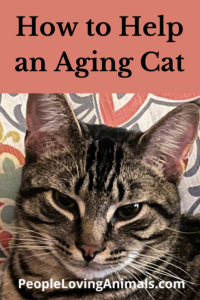Many cats, especially indoor cats, can live well into their late teens and some even into their twenties. I personally had one cat who lived 14 years, and another who lived a full 20. But as cats get older, their habits, behaviors and needs can change.
Starting usually around 10 or 11 years of age, your cat transitions from an adult cat to a senior cat. The symptoms can sometimes be difficult to spot, but if you pay attention, you can do things that will not only help make your cat’s life a bit easier but could very well extend their life.
In this article, we’ll discuss the symptoms of an aging cat, how to spot the changes, and how to help an aging cat.
Watch My Video: How to Help an Aging Cat
This post contains affiliate links. If you make a purchase, I’ll earn a commission (at no extra cost to you). As an Amazon Associate, I earn from qualifying purchases. I donate 10% of my profits animal charities.
Symptoms of an Aging Cat
Some of the signs you might see that’ll make you realize your cat is starting to show the effects of aging are the inability to jump up on the bed or furniture as easily or not at all, changes in appetite or weight, more time sleeping and less time playing, and, of course, the onset of medical issues.
As you begin to realize your cat is aging, there are several things you can to do make their life a little easier.
Medical Issues in Elderly Cats
Aging cats can develop several common medical problems. These can include kidney disease, intestinal issues, diabetes, pancreatitis, and cancer.
They can also develop some lesser-known ailments such as loss of hearing or diminished eyesight, lowered sense of taste or smell, and even senility.
You might consider getting an inexpensive pet health insurance policy to help cover our cat’s medical expenses. My recommendation is Lemonade Pet Insurance.
How to Tell if Your Cat is Suffering from Signs of Aging
The best way to determine if your cat is showing signs of aging or showing signs of any sort of problem or issue for that matter, is to pay attention to behavior changes. These may include a change in their appetite or their weight. They may not take care of their coat as well and start looking a little shabby.
They may not consistently using the litter box, crying during the night, or even start getting lost in the house. They might also show signs of confusion sometimes.
Remember that these things may not just be signs of aging. Your cat could be having a serious medical issue. You should always consult your veterinarian whenever you cat shows any changes in behavior.
Don’t just write these things off as signs of aging. It’s also important to realize that cats are good at hiding symptoms. Any time a cat is having any sort of issue, you should go take the cat to the vet sooner rather than later.
Cats usually are quite ill before they display symptoms of an illness. It’s like a toddler who can play all day with a fever of 102. The kid will play until he literally drops.
Sounds dramatic, I know. But this is how serious this is. If your cat is showing any changes in behavior, please take them to the vet!
8 Ways to Help Your Aging Cat
1. The litter box. As your cat ages, it might become more difficult for them to use the litter box. First, if the litter box is in the basement, if may be difficult for the cat to go up and down the stairs.
If the litter box is in the back corner of the house, through twists and turns or at the end of a long hallway, the cat may actually having trouble remembering where it is and how to find it.
You should also consider the size and height of the litter box. Jumping in and out of a litter box can be difficult for an aging cat or a cat suffering from arthritis. You might consider purchasing a simple, low-height litter box.
More things you should consider regarding your cat’s litter box are explained in this article, How to Get Your Cat to Use the Litter Box – And Why They Won’t (includes video).
2. Adjust things they jump up on. One of the most problematic health issues for aging cats is arthritis. This can hinder a cat’s ability to jump up on the bed, the furniture, their perch, windowsills, etc.
Consider adjusting the height of the things you can or offer them an alternative such as a soft bed on the floor or a way to get up into the window without having to jump.
I had a set of stairs for one of my cats who lived to 20 years old. I kept these next to my bed so she could easily sleep with me without having to jump up onto, or down off of, my bed. You can see a selection of cat stairs HERE.
3. Gently encourage play. Aging cats may be less interested in playing or may not be able to play as long or as hard as they used to. You shouldn’t try to force your aging cat to play, but it’s ok to gently encourage play to stimulate their interest.
Physical exercise, as well as mental stimulation, are still important for elderly cats. You can see a selection of interactive cat toys HERE.
4. Help them with grooming. Some cats may have difficulty grooming themselves as they age. They may need to be brushed by you more often, or for the first time if you’ve never had to help in the past.
Be careful with this. Some aging cats don’t enjoy being touched, stroked or brushed even if they’ve always enjoyed these things in the past.
Begin helping with grooming in small steps to make sure it’s an enjoyable experience for your cat, not a stressful one.
5. Pay Attention to Their Diet and Water Intake. Cats are prone to kidney disease and constipation as they age, especially if they aren’t taking in enough water. Discuss with your vet the best diet for your cat.
Your vet may recommend switching to a senior cat diet. Also, it’s important for cats to have moist food daily. You can increase your cat’s hydration by providing canned food each day.
Watch My Video: What Should You Feed Your Cat?
Also, most elderly cats suffer from arthritis. The best thing you can do to prevent pain from arthritis is to keep your cat at a healthy weight. Just one or two pounds of extra weight can increase joint pain significantly.
For more information about the best food for cats, you can read my article, Which Food is Best for Cats? Canned Cat Food vs. Dry Cat Food.
Watch My Video: What is the Best Food for My Cat?
6. Provide Supplements. Providing a supplement specifically made for senior cats is helpful, especially when they contain ingredients like Glucosamine which helps a lot with joint health. You can see a selection of supplements for senior cats HERE.
7. Lower their stress. Most people know that cats are easily stressed. Even a minor variation in their daily routine can make them a nervous wreck, let alone big events such as moving or the arrival of a new pet or newborn baby into the family.
I recently wrote an article describing 10 things that stress your cat out. You can read it HERE. You can also watch this video to find out more.
Watch My Video: Why Your Cat is a Nervous Wreck!
8. Take Them to the Vet Twice Per Year. A thorough veterinary exam can extend your cat’s life and drastically improve their quality of life. Being checked regularly by a veterinarian is critical for elderly cats. Ideally, cats over 10 or 11 years of age should be examined by a veterinarian twice per year.
The blood work your vet orders can detect the onset of serious health issues while there’s still time to make changes that will make a difference. Having the cat’s teeth looked at can uncover dental disease that can risk your cat’s health (and cause enormous pain).
And having your vet’s supervision for your cat’s diet, weight and overall health make a huge difference in your cat’s well-being and your own. I know from experience that caring for an aging cat can be stressful, upsetting, and sometimes even scary. Don’t do it alone. Let your veterinarian be your partner in caring for your elderly cat.
Check out my post, Is Your Pet in Pain? In that post, we talk about how to know if your cat is in pain and what to do about it. Senior cats have pain more than you know!
For help paying for your cat’s medical expenses, read my article, Getting Help With Vet Bills (includes video).
More Information About Senior Pet Care
- How to Help an Aging Cat
- Exercising Senior Dogs
- Is It Too Late to Train My Dog? You Can Teach an Old Dog New Tricks
- What Are the Benefits of Adopting Senior Pets?
- 10 Tips When Caring for a Senior Dog
I Hope This Was Helpful!
The best way you can help an aging cat is to know that as they age, their physical and behavioral needs will change.
Spotting problems in time to do something to prevent difficulties for your cat is the best way to help them feel better, and live better, for as long as possible.
I Donate to Animal Charities
Thank you for visiting my website. I hope you found this post helpful, and I hope you’ll check out my other cat health posts.
I donate 10% of my profits from website to animal charities. You can see a list of the charities I donate to here. If you like this site, please share it with fellow cat lovers! Thanks so much. Debra










Your information about the differences in an ageing cat and how to help them as they age was very interesting. A lot like reading suggested list for senior citizens. I think people get in the habit of interacting with their cats in a certain way and don’t realize that the changes in the cat’s behaviour might be a result of ageing
Our neighbor’s cat has started spending a good bit of time on our storeroom step. A sunny spot, out of the wind. With his scraggly coat, he shows the signs of ageing as you have described.
Do you give your cat supplements with meals, just to help them stay healthy? As they are prone to kidney issues, is there anything to help them with the issues that ageing brings for kidney health?
Growing up on a farm and having barn cats, the care for house cats is sure different. Our cats either fell victim to prey or ran away on the farm. One might be around 3 or 4 years, but not longer. Guess it was tougher living in the barn than a house.
Thanks so much for your comments. Yes, I do suggest vitamins for pets. They even make Senior vitamins. Regarding kidney disease, I believe one of the best things you can do to help prevent that in cats is to make sure they have a moist diet. I have an article on my site about that:
https://peoplelovinganimals.com/what-is-the-best-food-for-my-cat-canned-cat-food-vs-dry-cat-food
as a pet owner it could be really painful watching your cat grow old.but there is more I could do to help him stay old..To help your older cat enjoy her golden years, consider these simple suggestions. See the vet. Schedule regular veterinary exams to enhance your older cat’s well-being. “Six-month checkups for geriatric cats are great,”..
thanks for sharing such an intriguing review I look forward to share it
hellooo dear, thanks for sharing an amazing post, it really is an eyeopner, hopefully it gets to more people, ill surely share it on my social media, your website is plain and simple easy to navigate and understand, i really do fancy these post alot thanks i already saved these post so as much as to come back for future reference, ill ill surely do some recommendation, thanks alot for the info.
I have gone through a lot of your articles, and I must say that I love your compassionate love for pets, it’s really inflict me and I feel like I should get a pet but having to watch your pets grow old and probably die Someday could be painful.. thanks indeed for sharing this awesome review on how to help an aging cat it will really serve a lot of good to pet owners…
thanks for sharing, have a great day
Cats are considered to be elderly once they reach 11 years with senior cats defined as those aged between 11-14 years and super-senior cats 15 years and upwards. When caring for older cats it sometimes helps to appreciate their age in human terms. To help your older cat enjoy her golden years, consider seeing the vet. doctor on regular veterinary exams to enhance your older cat’s well-being. Six-month checkups for geriatric cats are great.